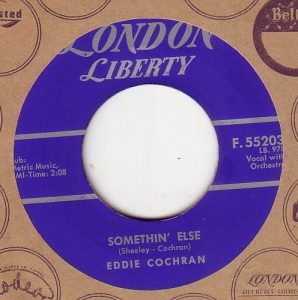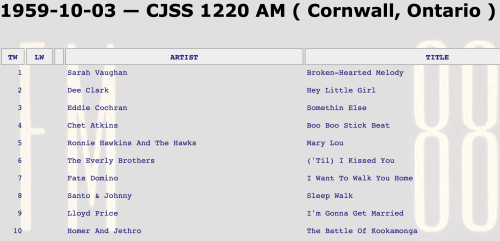#1: Somethin’ Else by Eddie Cochran
City: Cornwall, ON
Radio Station: CJSS
Peak Month: October 1959
Peak Position in Cornwall ~ #3
Peak position in Vancouver ~ #32
Peak Position on Billboard Hot 100 ~ #58
YouTube: “Somethin’ Else”
Lyrics: “Somethin’ Else”
Eddie Cochran was born in Albert Lea, Minnesota, in 1938. His family moved to the Los Angeles area in 1951 where Eddie attended Bell Gardens Junior High. While there he became friends with Connie ‘Guybo’ Smith. Smith was already a promising musical talent who played bass, steel guitar and mandolin. Eddie and Connie began to jam together and gave a concert at their junior high school. Connie “Guybo” Smith went on to become Cochran’s bass player and was one of the musicians heard on most records during Eddie’s brief professional career. In 1953, while still in junior high school, Eddie met another musician named Chuck Foreman. The two experimented with Foreman’s two-track tape recorder. The pair made recordings of a number of songs including “Stardust”, “The Poor People Of Paris”, “Hearts of Stone” and the “Cannonball Rag”. Cochran graduated from Bell Gardens Junior High in 1954.
In the following months Eddie met country singer Hank Cochran, of no relation. In January 1955 Hank offered Eddie a job as his guitar accompanist. Eddie left school and for the next year and a half Hank and Eddie played and recorded as The Cochran Brothers. At Sunset Recorders in Hollywood The Cochran Brothers recorded several tracks, including “Mr. Fiddle.” Next, Eddie and Hank met songwriter, Jerry Capehart, who was searching for artists to demo his songs. By the end of 1955 Capehart had begun promoting The Cochran Brothers. In January 1956, “Walkin’ Stick Boogie” was released with the recording artists billed as Jerry Capehart featuring the Cochran Brothers on the Cash Record label. That spring The Cochran Brothers cut four rock and roll songs, including “Tired & Sleepy”. After this recording Eddie Cochran pursued a solo career.
In July 1956, “Skinny Jim” was Cochran’s first solo single release. His recording on the Crest label didn’t chart. Soon after Eddie was asked by producer Boris Petroff to sing a part in an upcoming rock ‘n roll filmed titled Do-Re-Mi. The film was later re-titled The Girl Can’t Help It. Cochran recorded a couple of tunes for the film, including “Twenty-Flight Rock”. A buzz was building around Eddie Cochran and in September he signed a contract with Liberty Records. Then, in December 1956, Eddie Cochran appeared in the rock’n roll film Untamed Youth, starring Mamie van Doren. Cochran played and sang a small part in the movie as a character named Bong. The song Bong (Cochran) sings in the movie is “Cotton Picker”.
In 1957 Eddie Cochran played guitar on a number of recordings by junior high school buddy, Don Deal. Deal had a minor hit in the fall of 1957 called “Unfaithful Diane”. Meanwhile, Cochran recorded a song in January 1957 written by John D. Loudermilk under the pseudonym Johnny Dee. It was titled “Sittin’ In The Balcony”.
Between May and August 1957 Eddie Cochran recorded the tracks of the only album he would end up recording titled Singin’ To My Baby. Songs recorded included “Drive In Show” which was released as Eddie’s third Liberty single. It climbed to #82 on the Billboard charts and #5 in Vancouver.
In the fall of 1957 Eddie Cochran appeared in concert with Buddy Holly at the Georgia Auditorium in Vancouver (BC). They toured Australia with Gene Vincent, Little Richard and Elis Lesley (billed as the female Elvis Presley) in what was boasted as The Biggest Show Of Stars for 1957. This was the first American rock and roll show ever to come to Australia. Every single date was sold out. This was also the tour where at the end Little Richard threw his jewelry into the water, left show business and gave himself to religion. At the end of the year Eddie Cochran released a single called “Cradle Baby” that may have only appeared on a record chart in Vancouver, where it climbed to #7.
In March 1958, Cochran and his touring band Dick D’Agostin And The Swingers recorded and were filmed in the music score for the movie Hot Rod Gang. At a studio session they backed up John Ashley on “Annie Laurie” and “Hit And Run Lover”, though Cochran was not credited for his performances. Around that time Eddie Cochran also played guitar on a demo called “Guitar Picker” recorded by Bob Luman. In June 1958, Cochran had his biggest chart success with “Summertime Blues” which peaked at #8 on the Billboard charts and #6 in Vancouver. The novelty cat fish vocals in the song were Eddie’s. His follow-up release was “C’Mon Everybody”, which stalled at #35 on the Billboard Hot 100. However, in the UK it climbed to #6. The year ended with Cochran playing at The Loews State Theatre in New York. He was part of an all-star show hosted by legendary rock ‘n roll DJ Alan Freed. Among the other artists at that concert were Chuck Berry, Jackie Wilson and Bo Diddley.
In January 1959, Cochran appeared in the movie Go, Johnny, Go! performing “Teenage Heaven”. During a saxophone solo in “Teenage Heaven” Cochran danced with his guitar. Chuck Berry, Jackie Wilson and the Ritchie Valens also starred in the movie. The single stalled at #99 on the Billboard Hot 100. Then on February 3, 1959, Buddy Holly, Ritchie Valens and The Big Bopper were killed in a plane crash in rural Iowa. On February 5th Cochran recorded “Three Stars”, a song penned by DJ Tommy Dee. Eddie Cochran made multiple takes of the song and found himself tearing up each time. Liberty Records chose not to release the song as they weren’t satisfied with any of the recordings that day by Cochran. Tommy Dee released his own recording which became a hit in May 1959.
Eddie Cochran played guitar on “Opportunity” and “Doin’ The Hully Gully” for Jewel Aitkens in the fall of 1959. Cochran also played guitar on a number of unreleased demos for Johnny Burnette in late 1958 into 1959, as well as other records for Margie Rayburn and others.
On July 24, 1959, Eddie Cochran returned to perform in concert in Greater Vancouver at the Edmonds Rollerway in Burnaby (BC). Next, Cochran released “Somethin’ Else”.

“Somethin’ Else” was co-written by Eddie Cochran and his fiancé Sharon Sheeley. Born in 1940 in Newport Beach, California, Sheeley wrote “Poor Little Fool” when she was fifteen years old. The song was about her disappointment after a break-up with a boyfriend in high school who happened to be Don Everly of the pop duo, The Everly Brothers. Sheeley was acquainted with Elvis Presley and he encouraged her to be a songwriter. Living in Newport Beach, Sheeley drove to the home of Ricky Nelson hoping to meet him. Luckily, he was at home when she pretended her car had broken down outside his house. She played her song and he agreed to record it, making her the first female to have a number one hit on the Billboard charts without a male co-writer. Before Sheeley met Ricky Nelson she had begun a modeling career in Hollywood.
Sheeley is the woman referenced in Eddie Cochran’s song, “C’mon Everybody”, who walks around barefoot. She was in the car with Eddie Cochran and Gene Vincent in England in April 16, 1960, when it crashed into a lamppost in Wiltshire. Cochran died the next day from brain injuries and Gene Vincent broke his collarbone and ribs. Shelley broke her pelvis. At the time Sharon Sheeley and Eddie Cochran were unofficially engaged. In 1961 Sheeley met Jackie DeShannon and they became a successful female songwriting team, a first in the early rock n’ roll period. They wrote the hit, “Dum Dum”, for Brenda Lee. Sheeley also had songs she wrote recorded by Glen Campbell, PJ Proby, The Crickets, The Fleetwoods and Mac Davis. In 1961, Sharon Sheely married Los Angeles DJ Jimmy O’Neill. Together, they created the hit TV series in the mid-60’s on ABC-TV called Shindig! In 2002 Sheeley suffered a cerebral hemorrhage and died at the age of 62. She has a cenotaph marker next to Eddie Cochran at Forest Lawn Memorial Park Cypress, in Orange County, California.
“Somethin’ Else” is a song about a guy who sees a “girl” walking down the street who is “something else,” – a knock out. But she isn’t interested in him, only other guys who aren’t in his class. He sees a brand new convertible that is out of his class. He can’t afford to buy it, he can’t even afford the gas for that kind of car. He dreams of getting a girlfriend, and a car. It ends up that instead of getting a fifty-nine Ford, he gets a forty-one (1941) Ford. He ends up getting a girlfriend. Not the one he sees that doesn’t notice him. But getting to know a girl who does notice him, he realizes that she, too, is “somethin’ else.”
“Somethin’ Else” peaked at #3 in Cornwall (ON), and Potsdam (NY), #6 in Sulphur (LA), #8 in Bethesda (MD), and Denver, and #12 in Phoenix. The song peaked at #56 on the Cashbox Top 100 Singles chart in September 1959, #58 on the Billboard Hot 100, and #22 on the UK Singles chart.
On January 8, 1960, Eddie Cochran recorded his last session for Liberty Records. “Three Steps To Heaven” was among several songs he recorded with the remaining Crickets, formerly with Buddy Holly, as a back-up band.
After recording “Three Steps To Heaven”, Eddie Cochran left for the UK to join Gene Vincent in a tour of the Scotland, England and Wales. While in England Eddie appeared on the first of four TV-shows, Boy Meets Girls, on January 16th. Eddie and Gene had a big impact on the British teenagers and budding rock ‘n roll bands. Cochran has had his songs covered by The Beatles, The Rolling Stones, David Bowie, Cliff Richard, Led Zeppelin, Rod Stewart, Keith Richard, U2 and others in the UK pop music scene.
On April 17, 1960, at the end of the tour, Cochran and Vincent drove to the airport in a taxi, along with Eddie’ fiancee Sharon Sheeley. The taxi got in a motor vehicle accident near Chippenham. Sheeley and Vincent were only slightly hurt, but Eddie Cochran died of severe head injuries later that night. The following month, “Three Steps To Heaven” was posthumously released. Oddly, this born-in-the-USA rock ‘n roll star’s posthumous release didn’t crack the Billboard Hot 100. Between 1960 and 1988, eight more singles by Eddie Cochran posthumously appeared on the UK singles chart.
October 21, 2023
Ray McGinnis
References:
“Teenage Heaven” clip from Go, Johnny, Go!
Eddie Cochran, “Three Stars” 1959.
Bobby Cochrane and Susan Van Hecke, Three Steps to Heaven: The Eddie Cochran Story (Hal Leonard, Milwaukee, Wisconsin, 2003).
Julie Mundy and Darrel Higham, Don’t Forget Me: The Eddie Cochran Story, (Billboard Books, 2001).
Ian Clayson and Penny Valentine, Sharon Sheeley: Songwriter of Poor Little Fool, Guardian, August 29, 2002.
Geoff Barker, “The Death of Eddie Cochran,” BBC, February 27, 2009.


An excellent overview of Eddie’s brief but productive career.
The posthumously released Three Steps to Heaven reached #1 in the United Kingdom, though (as you noted) it failed to reach even the lowest rungs of the Billboard Hot 100. Likewise, flip side Cut Across Shorty got overlooked. Years later, however, Rod Stewart did a sizzling cover version of Cut Across Shorty.
Further to your mention of Eddie, Little Richard and Alis (the female Elvis) Lesley touring Australia: A promotional photo of the three of them graced the cover of Bob Dylan’s 2022 book The Philosophy of Modern Song.
https://encrypted-tbn0.gstatic.com/images?q=tbn:ANd9GcTF3kf5spNmfmZsofE62JJZBT6Lx4DVfddLMw&s